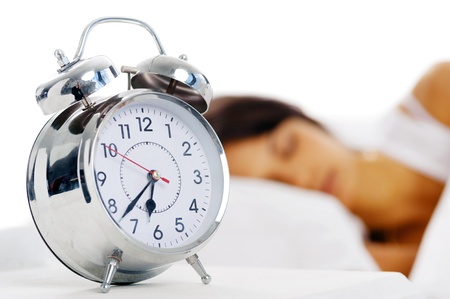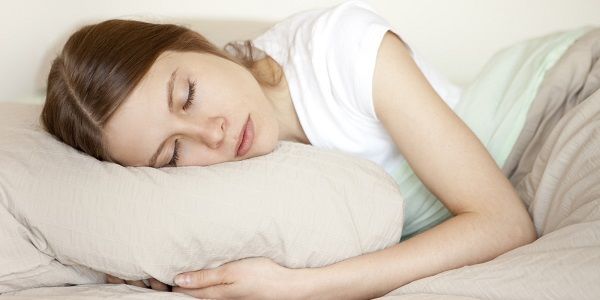Sleep loss is nothing to bat an eye at. It can increase your risk of certain diseases, cause you to be less productive at your job, and may even shorten your lifespan.
Research shows that many people aren’t even aware of their sleep problems. If you’ve been noticing that it’s harder to concentrate throughout the day or that your skin appears dull, your sleep might be responsible.

Here are a few other ways sleep loss affects your health.
What Causes Sleep Loss?
Sleep is a complex yet delicate process that can easily be disrupted. Your sleep cycle is managed by a 24-hour cycle called the circadian rhythm. It is controlled by your master clock, which is a group of 20,000 neurons that make up the suprachiasmatic nucleus or SCN.
The SCN sits above the optic nerves in the hypothalamus, and they are necessary for detecting light. When your optic nerves sense light, they send a signal to the SCN telling it to make melatonin, which is a hormone that makes you feel tired (1).
Light exposure is the most prominent environmental cue that keeps you awake at night. Even if it’s dark outside, you can keep yourself awake by staying up late to watch television or scrolling through your smartphone. Any electronic device that emits blue light has the potential to tell your brain not to make melatonin, which can make it very hard for you to fall asleep.
Other lifestyle habits that can keep you awake include drinking caffeine too close to bedtime, environmental noise or distractions, work stress, and chronic pain. Eating a large meal at night may also keep you up. Alcohol may seem like a good way to wind down at the end of the day, but it can keep you awake by elevating and then dropping your blood sugar levels. Drinking too many liquids at night may cause you to get up to use the bathroom. Even the wrong temperature in your bedroom can keep you awake.
Dangers of Sleep Deprivation
Most people are well aware that sleep loss makes them grumpy. But not everyone knows how dangerous sleep loss really is. Research shows that sleep deprivation increases your risk of obesity, diabetes, stroke, and heart disease (2). It may also shorten your lifespan. According to a 2017 study, getting less than six hours of sleep at night makes you 12 percent more likely to have a premature death (3).
Research from a 2010 study indicated that sleep loss in humans leads to difficulties concentrating, impaired perception, slower reaction times, and visual disturbances. The study also found that sleep loss causes micro episodes of sleep in which a person’s eyes are open, but their brain does not receive information as if they are asleep.

This can lead to an increased number of accidents and errors. Poor memory and thinking skills, emotional disturbances, and increased aggressiveness are also caused by sleep loss (4).
Being deprived of 20 to 25 hours of sleep is the equivalent of having a blood alcohol concentration of 0.10 percent. When you’re tired, your motor skills become affected. You might stumble or fall more often, which is especially dangerous to the older generation. Sleep loss might cause you to shake or have tremors.
It impairs your speech and makes you sound confused. It also alters your immune system by making it less reactive to pathogens and disrupts your hormone secretion, especially human growth hormone, which is responsible for proper growth and development (4).
Lack of sleep also makes you age faster. According to a 2013 study, poor sleepers had increased skin aging, reduced skin barrier protection, and were slower to recover from environmental stress, such as sun damage. The study also found that people who did not sleep well were not as happy with their overall appearance (5). Sleep loss decreases the amount of blood flow to the face, which is responsible for giving you a healthy glow (6).
Finally, research shows that sleep loss could make it harder to lose weight. A 2004 study found that people who sleep less than six hours a day are 30 percent more likely to be overweight than people who sleep seven to nine hours. This is because sleep regulates peptides that control your appetite.
Ghrelin is a hormone that causes hunger while leptin makes you feel full. Sleep loss causes you to gain weight because it increases ghrelin and reduces leptin. It also makes you crave foods that are high in fats and carbohydrates (6).
How To Get Your Sleep Back On Track
Getting your sleep back on track requires some work on your part, but it’s well worth the effort. You can start by improving your sleep habits. Your body likes a routine. Developing a bedtime schedule may be able to help you sleep. According to a 2009 study, a nightly routine helped young children fall asleep faster. Although the study was intended for children, there is evidence to show that anyone can benefit from developing predictable sleep patterns (7).

Going to bed at the same time each night can help you mentally and physically prepare for sleep. Similarly, waking up at the same time each morning will help you reset your circadian rhythm.
You should get to the point where you start feeling tired at your designated bedtime, and you wake up without an alarm clock in the morning. Try to keep this routine even on weekends. If you go to bed later than you should, wake up at the same time. Keep naps short (around 30 minutes long) and aim for a mid-afternoon time slot. Avoid napping after 3 pm.
Unlike prescription drugs, natural sleep aids are less likely to cause side effects or dependency. Melatonin can be used for a variety of benefits in addition to improving your insomnia. Because of its high antioxidant content, melatonin has been shown to fight cancer, reduce skin aging, and counteract the adverse side effects of chemotherapy.
When taken as a supplement, melatonin crosses the blood-brain barrier to protect against neurodegenerative conditions such as Alzheimer’s and dementia. Other natural ingredients to keep in mind include valerian root, l-tryptophan, and gamma-aminobutyric acid or GABA.
References
- https://www.nigms.nih.gov/education/pages/Factsheet_CircadianRhythms.aspx
- http://www.nhs.uk/Livewell/tiredness-and-fatigue/Pages/lack-of-sleep-health-risks.aspx
- https://academic.oup.com/sleep/
- https://www.ncbi.nlm.nih.gov/pubmed/20442067
- https://www.sciencedaily.com/releases/2013/07/130723155002.htm
- http://www.webmd.com/sleep-disorders/features/10-results-sleep-loss#1
- https://www.ncbi.nlm.nih.gov/pmc/articles/PMC2675894/
- https://sleepify.co/insomnia-statistics/
Revision 18.1.2019: dead link removed.









































